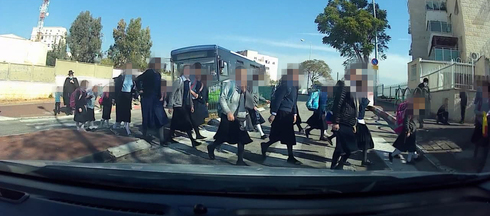In-depth: Pandemic exacerbates long-existing tensions that, according to one expert, can only be quieted through political resolution with leaders abandoning personal and sectoral interests for the good of the country
The relationship between Israel’s Haredi (ultra-Orthodox) population and the rest of the country’s Jewish citizens is at a breaking point as a result of coronavirus.
“There hasn’t been anything like this in the last 50 years or so, maybe even more,” Professor Benjamin Brown of the Hebrew University of Jerusalem and the Israel Democracy Institute, an expert in Orthodox and Haredi Judaism, told The Media Line.

Dr. Dan Ben-David, head of the Shoresh Institution for Socioeconomic Research and an economist at Tel Aviv University, agrees.
“I don’t think we’ve ever been at such an impasse before as we are today,” he told The Media Line.
Many of Israel’s ultra-Orthodox leaders and their followers have flouted the Health Ministry’s coronavirus restrictions, including lockdown orders, as Israel faces the largest health crisis and one of the worst economic situations in its history.
Just last week, thousands of Haredim attended the funeral of one of their leaders, Rabbi Meshulam Dovid Soloveitchik.
“The majority are good people, but their leadership is leading them down the drain,” Ben-David said.

On January 8, as Israel entered into a stricter phase of the third lockdown and closed schools, some yeshivas and other Haredi-run institutions for children refused to shutter, with authorities hesitating to enforce the rules.
“Their cynicism is unparalleled to a certain extent. They regularly insist on preventing their children from receiving a core-curriculum education [basic secular studies], not just during the corona pandemic, but part of the problem is they want to basically be able to brainwash their children so that whatever they say goes and whatever comes from the outside doesn’t go,” Ben-David said.
“They don’t teach them science so they don’t understand how viruses work,” he added. “They don’t understand math so they don’t understand what an exponential function is. When you double or triple each time the number of people each person infects, then that is causing a lot of them to die and a lot of them to be sick, and along with them the rest of us.”
“They’re bringing down an entire health care system and an economy by just simply craftily violating all the rules and regulations,” Ben-David continued.
These behaviors have only exacerbated tensions in their existing relationship with other Israeli Jews, who have long felt that Haredim give to Israeli society a lot less than they take.

While roughly three-quarters of Haredi women work outside the home, the men mostly study in yeshivot. With an average of a little over seven children per family, many still cannot make ends meet and are dependent on Israel’s welfare system. In addition, full-time religious study provides most Haredi men with an exemption from the military service that is mandatory for other Jewish Israelis.
“People feel … they enjoy the fruits of the Israeli worker and they also disturb public health … They simply don’t give a damn about what the government says and they do it in a mocking and scornful way and it really irritates non-Haredim,” Brown said.
“It’s [expletive] ridiculous. Maybe if the police had actually enforced the rules in these religious neighborhoods, we wouldn’t be in our third lockdown,” Ari Klein, a secular Jerusalemite, told The Media Line. “They don’t follow any of the health protocols. Stores in their neighborhoods have great deals on baby stuff but I won’t go because it’s not worth the risk.”
Haredi mother of eight Miriam, who declined to give her last name, has also experienced this friction. A secretary in a Jerusalem area office, she feels that she is on the receiving end of the anger of the broader Jewish population.

“I was waiting in the lobby with a woman and her son for the elevator. When it came, I entered and held the door so it wouldn’t close,” she told The Media Line. “The lady motioned to go ahead and said she would take the next one. I heard her tell her son that there was no way that she would let him ride in an elevator with [a Haredi person] because she didn’t want him to get sick.”
“I was so mad because I wear a mask. My family follows the rules. Everyone I know does the same,” Miriam added.
Brown believes that tensions between the Haredim and everyone else will simmer down once the pandemic is over.
“People will direct their energies much more to regaining their work and … their normal life rather than fight[ing] about how you behaved in the past,” he said.
However, Ben-David says it will take political change for ties between the two groups to improve.
“If leaders will put the entire country before personal and sectoral interest, then I think they have the ability to calm things down and get us on a sustainable path,” he said. “It has begun to dawn on people that we have basically an insurrection here of individuals who refuse to obey Israeli law, from what we mandate in the schools to health care and all down the line, everything that we do.”

“If things are already difficult when the Haredim are only 7 or 8% of the adults, what’s going to happen when their kids, who already are a fifth of the children in Israel, grow up?” Ben-David asked. “Who’s going to be able to pass laws and do anything in the Knesset then, let alone in two generations when, according to the Central Bureau of Statistics, they will be half of the children in Israel?” he said.
Ben-David says the tensions between the Haredim and the rest of Israel have only brought attention to deeper systemic problems that Israel as a whole faces, including a “dysfunctional” health care system and an education system that is ranked among the worst in the developed world.
“It’s not just the Haredim that are getting a crummy education,” he said.
“We need serious leaders at a serious time to take serious control of this country and put us back on a path that is sustainable and one that has a future,” Ben-David added. “Israel has a history of, when our back is to the wall to get our act together. Our back is pretty much to the wall now.”
“We’ve seen the future and we don’t like it. It’s time to do something about it while we still can,” he said.
As reported by Ynetnews
